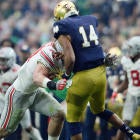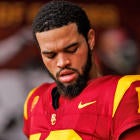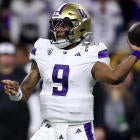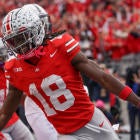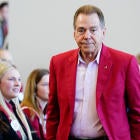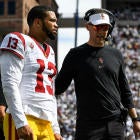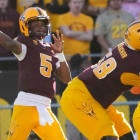A players receiving a second targeting penalty in a season resulting in a suspension is a rule change unlikely to pass, according to the chair of the NCAA Football Oversight Committee. West Virginia athletic director Shane Lyons told CBS Sports that the nature of the targeting penalty itself makes more discussion imperative.
Such suspensions were proposed by the NCAA Football Rules Committee earlier this month. Their passage will be considered in April by the NCAA Playing Rules Oversight Panel (PROP).
"I would say all of [the rules changes] -- with the exception of the dismissal -- will probably be approved," Lyons said. "That one probably needs a bit more discussion."
For a player hit with a second targeting penalty, the rules committee proposed an immediate suspension for the remainder of that game and the next game. That proposal is one of the more contentious this year. Critics have said it is unfair to suspend a player for an act that is so difficult to define.
"They went through some video and we all had to vote whether it was targeting," Lyons said. "Out of 10 slides, it was probably three of the 10 we were 100 percent consensus. The other seven, you're waffling one way or another."
Lyons' committee provides input to the rules committee in approving the rules changes. Other proposed changes include:
- Kickoffs: Eliminating the two-man edge formation
- Overtime: (1) Running alternating 2-point plays, as opposed to starting new drives, beginning in the fifth OT; (2) Inserting a 2-minute rest period after the second and fourth OTs.
- Blind-side blocks: Personal foul and 15-yard penalty for delivering a blind-side block "by attacking an opponent with forcible contact"
Lyons has been West Virginia's AD since 2015. Prior to that, he played for the Mountaineers and was a former athletics executive with Alabama, Texas Tech, the ACC and the NCAA.
"You could make a bad call … and the kid is sitting out a whole 'nother game," Lyons said. "We've got to discuss that. You send a message and you want to change behavior. It's changing the behavior, not only because they're hitting the kid wrong but it's for that kid's safety as well."
The NCAA's targeting rule has existed since 2008 with players ejected for the penalty beginning in 2013. Throughout its existence, critics have called for a more solid definition of the rule.
The definition of a "defenseless player" alone includes 10 bullet points in the NCAA rules. In the new recommendations, "letting the call on the field stand" during a review would be eliminated. The violation will either be confirmed or not.
Targeting calls can be overturned after video review.
"Any time your eyes were facing to the ground [when making a tackle], it's targeting," Lyons said. "It probably erred on the conservative. If your eyes are down and you don't see what you're hitting, to me, it's simple."
It's not known how many players nationwide had multiple targeting penalties last season. Big 12 commissioner Bob Bowlsby told a group of reporters last week that one unidentified player had gotten seven such flags in 2018.
A total of 221 targeting calls were upheld nationally in 2018. That's up slightly from 211 in 2017 but up drastically from 2013 when only 31 targeting calls were upheld.
"A disqualification is a very severe penalty," said NCAA secretary rules-editor Steve Shaw. "It's designed that way to have everybody on board, to get everybody's attention. Did we have plays that were marginal? It was close. We don't want to disqualify a player from the game if the player didn't commit the targeting foul."
The American Football Coaches Association in January proposed at two-tiered targeting penalty. "Targeting 1" would include a 15-yard penalty if there was no malicious intent. "Targeting 2" would be a 15-yard penalty and an ejection for hits with malicious intent.
The NCAA rules committee did not take action on that proposal.
The 12-person roster for the all-sports PROP https://web1.ncaa.org/committees/committees_roster.jsp?CommitteeName=PROP includes Division I three members – committee chair and WAC commissioner Jeff Hurd, Pac-12 commissioner Larry Scott and Notre Dame associate AD Angie Torain.












